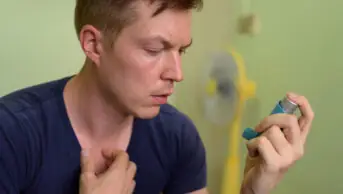
Shutterstock.com
The NHS in England has spent more than £433m on inhalers with links to the tobacco industry, since Philip Morris International (PMI) bought inhaler manufacturer Vectura in September 2021, The Pharmaceutical Journal can reveal.
An analysis carried out by The Pharmaceutical Journal of data published by Open Prescribing shows that total monthly prescribing for nine inhalers with ties to Vectura has increased by 3%, from 378,573 items in September 2021, when the UK-based device company was taken over by the tobacco giant, to 388,194 in March 2024.
Since September 2021, the NHS has prescribed 11,929,495 Vectura-associated items, amounting to a total cost of £433,865,654.
The figures have raised questions from respiratory clinicians about whether the NHS has an ethical duty to do more to flag which inhalers are linked to PMI — the maker of Marlboro cigarettes.
There were strong objections to the takeover, with the British Thoracic Society (BTS) and Royal Pharmaceutical Society (RPS) asking the government to block the deal, and the BTS warning it would cause “unresolvable ethical conflict”.
Following the buyout, Vectura was removed from a UK pharmaceutical conference, in response to a protest from academics. There were also reports that doctors and patients would shift to rival products.
In 2023, the charity Asthma + Lung UK, supported by the BTS, RPS, Primary Care Respiratory Society and others, published an information leaflet for patients that explained the link between PMI and some asthma inhalers.
Figures from Open Prescribing show that monthly spend on the inhalers has risen from £13.4m in September 2021 to £14.5m in March 2024 — the latest available data — and there has been no change since the link was publicised to patients.
GSK confirmed that the licence agreement with Vectura for four of its inhaler products expires “within the next year” and “will not be renewed or extended”.
However, manufacturer Mundipharma announced joint plans with Vectura in April 2024 to work on a more carbon-friendly version of its Flutiform inhaler.
Pharmacists have told the The Pharmaceutical Journal that it is a complicated issue, even for those with in-depth knowledge of the inhaler market.
Prescribers prioritise trying to find the most appropriate inhaler for the patient, said Toby Capstick, consultant pharmacist in respiratory medicine at Leeds Teaching Hospitals NHS Trust.
“We want to make sure we’re not working with the tobacco industry, but it is difficult because the patient is my biggest concern.”
He added that patients should be enabled to make an informed decision. “It’s about giving people that information in the same way that we should be giving people information about metered-dose inhalers having a higher carbon footprint than a dry-powder device,” he said.
Darush Attar-Zadeh, clinical fellow respiratory pharmacist at the North West London Integrated Care Board, said prescribers’ focus on NHS carbon goals meant the tobacco link was not the most pressing concern.
“You can tackle both, but you need to be an inhaler guru and have real know how,” he added.
A spokesperson for PMI told The Pharmaceutical Journal in a statement: “Vectura Fertin Pharma [which brings together Vectura, Fertin Pharma and OtiTopic] is developing a pipeline of products to support PMI’s ambition to explore adjacent avenues of growth beyond smoke-free products.
“It is operationally separate from other businesses owned by PMI and has its own executive leadership team overseeing day-to-day operations and dedicated governance for projects.
“The revenues generated by Vectura Fertin Pharma are reinvested into the wellness and healthcare business.”
The Department of Health and Social Care did not respond to a request for comment in time for publication.
The image for this article was updated on 6 June 2024.


